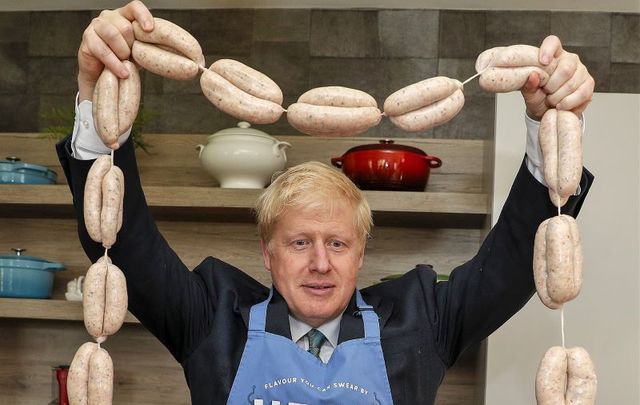So the Brexit circus has come down to the sausage war between the U.K. and Europe. It seems the more serious the issue, the more frivolous the headlines.
However, it is no joke. The Financial Times stated that the divide was so deep between the EU and the British that an interlocutor or special envoy from the U.S. should be considered. (This, if it happened, would be a separate appointment to a talked about Northern Ireland envoy.)
The British claim, reasonably enough, that meat products such as sausages from one part of Britain should be able to be sent to another part of Britain without any need for customs checks. It seems so sensible that one cannot imagine anyone registering an objection.
But the European Union did, and British Prime Minister Boris Johnson agreed that the sausages should be inspected.
The reason is that Britain is outside the EU while Northern Ireland, to avoid a land border, is considered within the EU for the Single Market and Customs Union.
Johnson signed the Northern Ireland Protocol that mandated sausages from London would be checked at the Irish Sea border to ensure they reached Europe’s standard.
He did so because he was continuing his drive to “get Brexit done” which won him the election. But, as usual, he kicked the can down the road on the North.
Now, of course, he is outraged that British sausages must be inspected despite signing up to that provision. In Johnson’s world, the truth is whatever he believes it to be at the time.
Johnson has been threatening to tear apart the Northern Ireland Protocol which was signed only last December and has the standing of an internationally agreed legal document.
In the meantime, however, many unionists and loyalists in Northern Ireland fear the sausage saga shows they are once again on the outside, being treated worse than their fellow U.K. members. They are threatening to resume non-cooperation, and in the loyalist enclaves, discussing all out violence if the Protocol is not changed.
The complication is that the dispute with Europe over sausages is actually helping Johnson with his voters who see him as standing up to Europe.
President Joe Biden had hardly departed Britain last weekend when Johnson made clear again, despite Biden’s entreaties, that the Brexit deal had to be changed.
On the other side of the realm are the EU powers who are long sick and tired of Johnson’s somersault on agreed treaties that he no longer wants to deal with.
French President Emmanuel Macron has launched the harshest attacks on Johnson, but again that must be looked at in the context of the upcoming French election where he faces a difficult path to a second term.
Indeed, everywhere you look there are complications. The EU insistence on inspecting all food, as if Britain was a third-world country, is unhelpful too. Part of the solution is to examine the meat shipments in the country of origin which would drop the customs work by 80 percent.
The Financial Times put forward an interesting idea, that an American envoy traveling between the EU and Britain could greatly help level off the flaring tempers and allow an effort to work out a solution. Interestingly, the paper instanced the role of Senator George Mitchell in Northern Ireland where he tackled business development first.
It is not the worst idea in the world, and one could see envoys to both Northern Ireland to ease internal strains, and one to soothe the troubled waters that lie deep between EU countries and the British.
Whatever the proposed solution, it must happen quickly with the violent days of summer ahead in the North. The U.S. role cannot be emphasized too much.
*This editorial first appeared in the June 16 edition of the weekly Irish Voice newspaper, sister publication to IrishCentral.




Comments